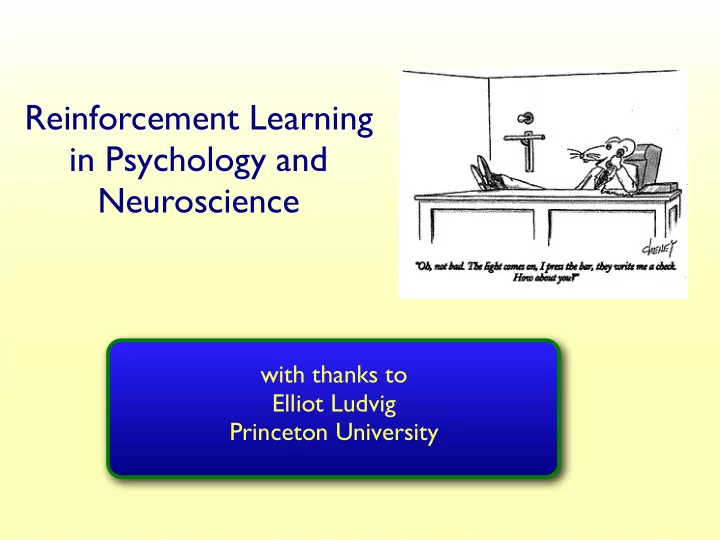

Reinforcement Learning in Psychology and Neuroscience with thanks to Elliot Ludvig Princeton University
Psychology has identified two primitive kinds of learning • Classical Conditioning • Operant Conditioning (a.k.a. Instrumental learning) • Computational theory: ❖ Classical = Prediction - What is going to happen? ❖ Operant = Control - What to do to maximize reward?
Classical Conditioning
Pavlov • Russian physiologist • Interested in how learning happened in the brain • Conditional and Unconditional Stimuli
Rescorla-Wagner Model (1972) • Computational model of conditioning ❖ Widely cited and used • Learning as violation of expectations ❖ TD learning as extension of RW
Operant Learning • Operant Conditioning is all about choice in 3 main ways: ❖ Decide which response to make? ❖ Decide how much to respond? ❖ Decide when to respond?
Thorndike’s Puzzle Box
Operant Chambers
Complex Cognition
Marr’s 3 Levels of Analysis • Computational ❖ What function is being fulfilled? • Algorithmic ❖ How is it accomplished? • Implementational ❖ What physical substrate is involved?
The Basic TD Model • Learn to predict discounted sum of upcoming reward through TD with linear function approximation: n � V t = w T t x t = w t ( i ) x t ( i ) i =1 • The TD error is calculated as: δ t = r t +1 + γ V t +1 − V t .
TD( λ ) algorithm/model/neuron Reward ∑ w i ⋅ x i States x i e i w i δ i or TD Features Value of state Error or action λ w i ~ δ ⋅ e i ˙ TD Eligibility Error Trace
Brain reward systems What signal does this neuron carry? Honeybee Brain VUM Neuron Hammer, Menzel
Dopamine • Small-molecule Neurotransmitter ❖ Diffuse projections from mid-brain throughout the brain from Pinel (2000), p.364 Key Idea: Phasic change in baseline dopamine responding = reward prediction error
Dopamine neurons signal the TD error error/change in prediction of reward Wolfram Schultz, et al.
Reward Unexpected Reward Value Representation- TD error independent Reward Expected predictions Cue of TD errors Value TD error Reward Absent Value TD error t = r t +1 + γ V t +1 � V t TD error
The theory that Dopamine = TD error is one of the most important interactions ever between artificial intelligence and neuroscience
Recommend
More recommend